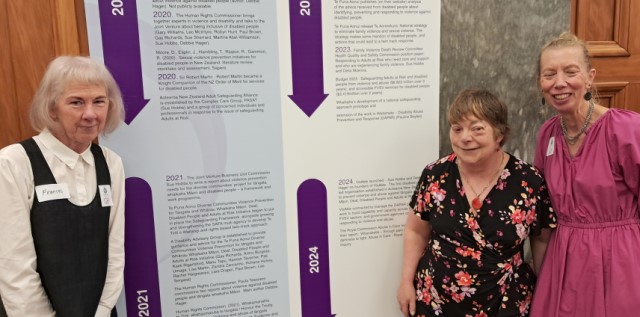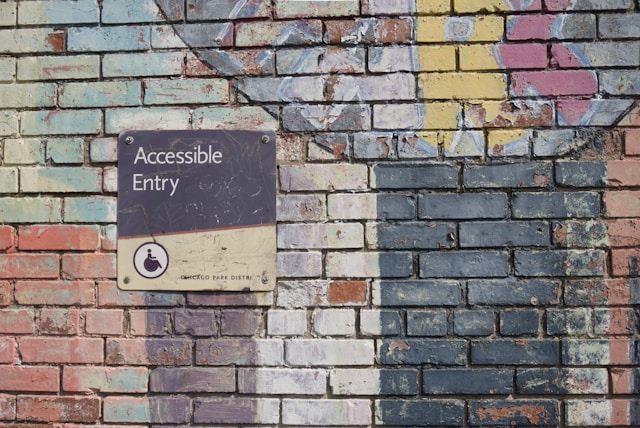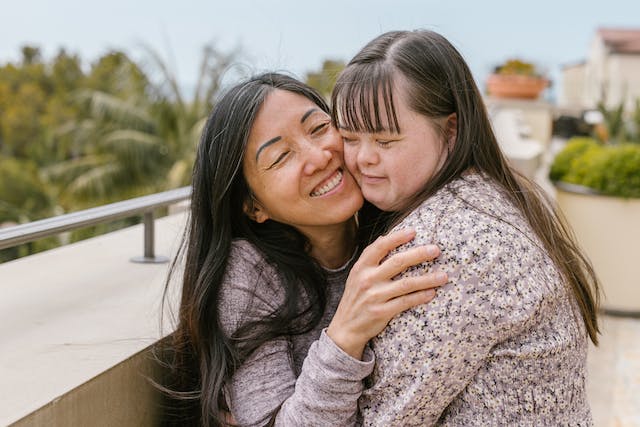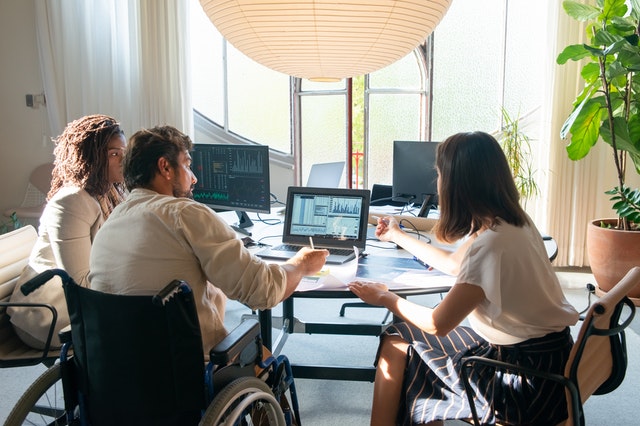2024 International Day of Persons with Disabilities: Launch of disabled-led organisation VisAble and related news
Tue 03 Dec 2024
This news story highlights the official launch of VisAble and related news including the changes to Whaikaha, Disability Support Services, and submissions open for the Responding to Abuse in Care Legislation Amendment Bill.

VisAble launch
Tāngata and whānau whaikaha Māori, tagata sa’ilimalo and their āiga-tele, d/Deaf, neurodivergent, and disabled people, along with their allies, policymakers and politicians celebrated the official launch of VisAble on 24 October 2024. The term "disabled people" is used to include tāngata and whānau whaikaha Māori, tagata sa’ilimalo and their āiga-tele, d/Deaf, neurodivergent, disabled people, Adults at Risk (across the lifespan), and their families.
VisAble is a disability-led not-for-profit organisation dedicated to making violence against disabled people visible, while building a more responsive family violence and sexual violence prevention system. VisAble works to equip and enable individuals and organisations working with or in contact with people who are impacted by violence, to make their services more inclusive and accessible. They provide a range of tailored services and programmes to assist organisations to implement a Te Tiriti o Waitangi and rights-based twin-track response (that is based on the Enabling Good Lives (EGL) principles and approach) in the prevention, identification and response to violence, abuse and neglect against people.
Whaikaha has contracted VisAble to deliver the Disability Abuse Prevention and Response (DAPAR) service, which works to safeguard the rights of disabled people and responds to situations of violence, abuse and harm. According to the Whaikaha website, DAPAR does this by:
- "Working directly with the disabled person and tāngata whaikaha Māori and building a Safeguarding Adults from Abuse (SAFA) multi-agency response to individual situations of concern
- supporting disabled people and tāngata whaikaha Māori to access mainstream family violence and sexual violence (FVSV) services
- building capacity and capability of individuals, organisations, services and systems through education and training."
Currently DAPAR is only taking referrals for SAFA responses to situations of concern from Whaikaha, Needs Assessment and Coordination, and Enabling Good Lives sites.
Minister for the Prevention of Family and Sexual Violence, Karen Chhour, and Minister for Disability Issues, Louise Upston, hosted the launch at Parliament. Speaking at the launch Louise Upston said that safeguarding adults at risk is "...a significant part of not just my work as a Minister for Disability Issues but across government." In her speech, Karen Chhour said,
"Disabled people are among the groups of people disproportionately impacted by family violence and sexual violence, and it is often harder for them to seek help and be heard.
It will take all of us, especially groups like VisAble, to enable effective responses from the system, as well as building a culture of care and respect for children, young people, adults at risk and families to prevent, respond and heal from violence."
Timeline storyboards at the launch outlined the work of advocates, including Sue Hobbs and Debbie Hager, leading to the launch of VisAble. Speakers at the launch gave tribute to Dr Pauline Boyles, who championed the Safeguarding project at Whaikaha. Paula Tesoriero, Chief Executive of Whaikaha, and Liz Tanielu, from Te Puna Aonui, also spoke at the launch.
At the launch Paul Gibson, VisAble's recently appointed Chief Executive, talked about:
"...three challenges and three solutions; listening to disabled people, implementing the Abuse in Care Inquiry recommendations and fixing the current problems of the increasing abuse against disabled people as a result of recent decisions."
Read a transcript of the launch event including all speakers.
Related news
Submissions open on Responding to Abuse in Care Legislation Amendment Bill and Government apology and response to Abuse in Care inquiry findings.
The Social Services and Community Committee are calling for submissions on the Responding to Abuse in Care Legislation Amendment Bill. Submissions are due 11 December 2024. It is an omnibus bill that proposes to amend 4 different Acts. One of the proposed changes is to amend the Crimes Act 1961, to explicitly include disability in the definition of a vulnerable adult.
Disabled people and advocates have more broadly criticised the use of the word 'vulnerable' to describe or refer to disabled people. Adult at Risk is the preferred language as noted in the Family Violence Death Review 2023 position paper Responding to adults at risk who need care and support and who are experiencing family violence (see page 3, footnote 3).
The legislation was announced following the government's public apology to survivors of abuse in care, which was delivered on the 12th of November 2024.
Disabled survivors made up just over a quarter (27 percent) of the 2,329 survivors who registered with the Inquiry. This does not include Deaf survivors or survivors who experienced mental distress. Deaf survivors including tāngata Turi Māori comprised 6 percent of the 2,329 survivors who registered with the Inquiry. Many Deaf people do not identify as disabled.
Many disabled people were among those listening and watching as the national apology was given by the Prime Minister, Christopher Luxon, followed by a statement from the Leader of the Opposition, Chris Hipkins. The national apology followed an earlier event at Parliament where the chief executives of several agencies also made apologies. Survivors had a brief opportunity to respond. Disability advocate, Gary Williams introduced a video clip of the late Sir Robert Martin giving evidence to the Abuse in Care Inquiry, followed by Fa’afete Taito, Keith Wiffin, Tu Chapman and Poi Karakia.
-
Access recordings of individual speakers on the Abuse in Care apology programme (recording available on Vimeo)
-
Read the full text of the national apology made by Prime Minister Christopher Luxon. Watch video of Christopher Luxon
-
Read statement of apology by Leader of the Opposition, Chris Hipkins. Watch video of Chris Hipkins
Disabled people were also critical of the arrangements for the apology, some saying the registration process was not accessible, while other survivors felt retraumatised by the need to go in a ballot to attend the proceedings at Parliament due to the restriction on the number of attendees.
Changes to Whaikaha and Disability Support Services
Update: Paula Tesoriero, Chief Executive of Whaikaha – Ministry of Disabled People, gave a statement about the changes to Whaikaha on 2 December 2024.
Following an independent review the government announced changes affecting the future of Whaikaha Ministry of Disabled People and funding for disabled people’s services. This included that the Ministry of Social Development (MSD) would take over responsibility for delivering the Disability Support Services by October 2024. The government also announced that Whaikaha — Ministry of Disabled People would become a stand-alone government department but with reduced responsibility for strategic policy advice, monitoring the effectiveness of services, education, and advocacy. These decisions were made 2 years after Whaikaha, Ministry of Disabled people was established.
The Independent Review of Disability Support Services (2024), subtitled "A report to provide advice on the actions that should be taken immediately in the 2024/25 financial year to better manage the increasing cost pressures faced by Whaikaha – Ministry of Disabled People", made 7 recommendations. It states:
"It is the assessment of the Reviewers that the Ministry is in urgent need of change. Current fiscal controls are inadequate; monitoring and evaluation is poor; there is a worrying lack of clarity about the terms and conditions of existing provider contracts; the roles of the NASCs and hosts are in need of review, and the shared services provided to the Ministry by MSD, MOH and HNZ, and the Departmental Agency Agreement with MSD, need to be reassessed and strengthened." (paragraph 154).
The disabled community and advocates have criticised these decisions. In response to these announcements, the New Zealand Disability Support Network (NZDSN) said,
"The disability community fought long and hard to have a Ministry focused on the needs of disabled people with control of its own budget. Whaikaha is not perfect, but it is a big step in the right direction. Now, the Government is taking us back to the days of the Office for Disability Issues, making Whaikaha a toothless ‘advisory’ agency that will have no budget for helping disabled people."
Kaihautū Tika Hauātanga Disability Rights Commissioner Prudence Walker says "...it is very disappointing to see a key function of Whaikaha, Ministry for Disabled People, removed from it."
There is a new Disability Support Services website. The Disability Support Services Taskforce is working on how disability support services should best be provided in the future and recently sought feedback through a survey. The survey has now closed and the Taskforce expects to share results in December. The survey is the first round of input on this work. Further community engagement and consultation will be held in early 2025.
UN International Day of Persons with Disabilities
The United Nations celebrates International Day of Persons with Disabilities on 3 December each year. The theme for 2024 is "Amplifying the leadership of persons with disabilities for an inclusive and sustainable future." The theme emphasises the importance of the participation of persons with disabilities in decision-making processes that affect their lives. For 2024 the UN outlined the following key goals and calls to action:
-
"Promoting the leadership of persons with disabilities in all areas of life.
-
Ensuring the inclusion of persons with disabilities in all aspects of society.
-
Increasing the participation of persons with disabilities in decision-making processes.
-
Raising awareness of the rights of persons with disabilities.
-
Celebrating the achievements of persons with disabilities."
Te Kāhui Tika Tangata Human Rights Commission is hosting a webinar in recognition of the International Day of Persons with Disabilities on 3 December 2024. Disability Rights Commissioner Prudence Walker will host a panel discussion. Registration is free.
Australia-based Our Watch is hosting a webinar on 11 December 2024 on Changing the landscape – new resources for preventing violence against women and girls with disabilities.
Other related UN Initiatives
In 2023, the Zero Project published the Model Policy Report, which showcases innovative policies that integrate the principles of the Convention on the Rights of Persons with Disabilities (CRPD) into the fabric of sustainable development. The Zero Project is an Australia-based global initiative to support the implementation of the CRPD.
The United Nations Development Programme and UN Women, with funding from the United Nations Partnership on the Rights of Persons with Disabilities, piloted the Addressing Stigma and Discrimination against Women with Disabilities project in Moldova, Pakistan, Palestine and Samoa. This project produced the Women with disabilities stigma inventory (WDSI) toolkit, a survey tool to assess the experiences of women and girls with disabilities regarding stigma, discrimination, and gender-based violence. Alongside developing the WDSI using a participatory approach, a methodological note and ethical guidelines were also produced to ensure a human rights–based approach and to minimise harm.
Related research
Recent research and publications added to our library include:
Child to parent violence and abuse: New Zealand's invisible family violence (2024) by Lee Tempest, published by VisAble
Reports from Understanding Policing Delivery: Tākata Whaikaha, D/deaf and Disabled People (2024) from the Donald Beasley Institute
Report on complaints to HDC about Residential Disability Support Services (2024) from the Health and Disability Commissioner | Te Toihau Hauora, Hauātanga makes recommendations for improvements after reviewing five years of complaints
Case studies from the Abuse in Care Inquiry related to the experiences of disabled and d/Deaf people:
Dr Patsie Frawley wrote a Disability overview for the Abuse in Care Inquiry highlighting the experiences of disabled people in care.
Earlier this year Kirsty Johnston produced the 8-part podcast series, Nellie's baby, which follows Sarah as she searches for her biological mother, a mental health patient who was institutionalised in Porirua Hospital.
Related media
Oranga Tamariki Act changes a step in the right direction, Beehive media release, 12.11.2024
Govt strengthens protection for people in state care, Beehive media release, 11.11.2024
Image: VisAble launch, permission provided by VisAble










